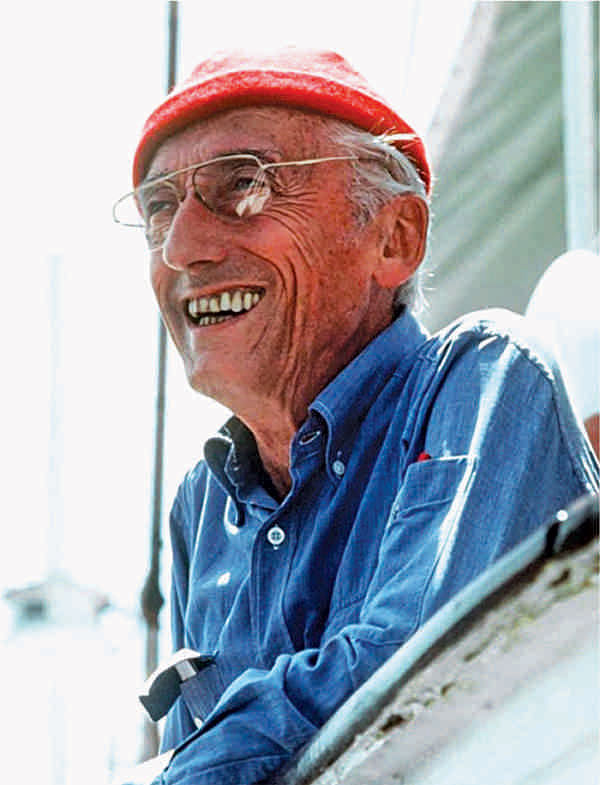JACQUES COUSTEAU

If there is one person who single-handedly fascinated millions of landlocked viewers to venture underwater into the unknown, through television, it is the Frenchman Jacques Cousteau. Jacques-Yves Cousteau was born on June 11, 1910, in the town of St.-Andre-de-Cubzac near Bordeaux, in France. As a child, he was quite sickly but learned to swim at the age of four. His initial dip led to his everlasting love for the sea. He was also very curious about machines. At the age of 13, Cousteau saved his pocket money to buy a movie camera. The first thing he did was to take it apart to see how it worked! He shot films around the house and credited it with "J Cousteau" director and chief cameraman. Despite his curiosity, Cousteau was not very interested in school. He was soon expelled from school for breaking one of the windows. As a result Cousteau was sent to boarding school. After graduating from France's naval academy in 1933, he was commissioned a second lieutenant. His initial dream to become a navy pilot was undermined by a near fatal automobile accident. Cousteau, not formally trained as a scientist, was drawn to undersea exploration by his love both of the ocean and of diving.
Cousteau served in World War II as a gunnery officer in France and later was a member of the French Resistance against the German occupation of the country. He subsequently was awarded the Legion of Honour for his espionage work. Cousteau's experiments with underwater filmmaking began during the war. Cousteau helped found the French navy's Undersea Research Group in 1945. He also was involved in conducting oceanographic research at a centre in Marseille, France. When the war ended, he continued working for the French navy, heading the Undersea Research Group at Toulon.
After struggling to finance his voyages, Cousteau soon realized he needed to attract media attention to make people aware of what he was doing and why it was so important. In 1953, he published the book The Silent World, which was adapted into a film which won both the Palme d'Or at the 1956 Cannes international film festival and an Academy Award in 1957, one of three Oscars his films received. This success allowed him to finance another expedition to the Red Sea and Indian Ocean sponsored by the French government and the National Geographic Society. In 1966, Jacques Cousteau launched his first hour-long television special, “The World of Jacques-Yves Cousteau” on the ABC television network. In 1968, he produced the television series The Undersea World of Jacques Cousteau, which ran for nine seasons. Millions of people followed Cousteau and his crew traversing the globe presenting intimate exposés of marine life and habitat. It was during this time that Cousteau began to realize how human activity was destroying the oceans. Jacques Cousteau also wrote several books, including The Shark in 1970, Dolphins in 1975, and Jacques Cousteau: The Ocean World in 1985. With his increased celebrity and the support of many, Cousteau founded the Cousteau Society in 1973. In the 1980s, Cousteau continued to produce television specials, but these had a more environmental message and a plea for stronger protection of oceanic wildlife habitat.
Cousteau received the U.S. Presidential Medal of Freedom in 1985. In 1987, he was inducted into the Television Academy's Hall of Fame. Cousteau died in Paris, France, on June 25, 1997, at the age of eighty-seven. His last book, The Human, the Orchid, and the Octopus: Exploring and Conserving Our Natural World (2007), was published posthumously.

 For all latest news, follow The Daily Star's Google News channel.
For all latest news, follow The Daily Star's Google News channel. 



Comments